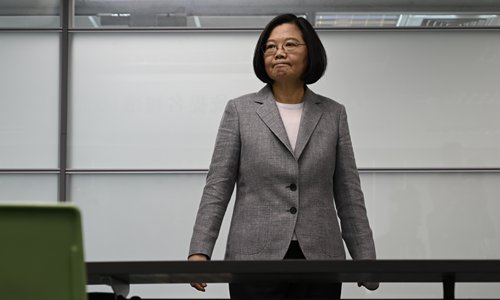HOME >> OPINION
Tsai plays puppet of US in NY stopover
Source:Global Times Published: 2019/7/12 19:18:40

Photo: AFP
During her trip to Caribbean countries, Taiwan regional leader Tsai Ing-wen on Thursday made her first stopover in New York since assuming office. Tsai and the Democratic Progressive Party (DPP) are feeling ecstatic. She became the third Taiwan "president" to have stopped over in New York, following similar trips by former leaders Chen Shui-bian and Ma Ying-jeou.
But Tsai sees fewer restrictions on her activities in New York, which include meeting UN ambassadors from Taiwan's "allies." The pro-independence Green camp on the island calls it a "major diplomatic breakthrough."
Leaders of the Taiwan region often visit their "allies" in the Caribbean, yet their real aim is to get to stop over in the US. The US is using Taiwan as a card against the Chinese mainland. The arrangement over the location and treatment of Taiwan regional leaders' stopover has become a US tactic to play the card. Allowing Tsai to make a transit stop in the US and enhance her profile there is by far the highest-level stopover the US has provided to leaders from the island. Obviously, this is related to the China-US trade war.
It can be assumed that Washington has prepared an even worse ruse to play the Taiwan card - making arrangements for the Taiwan regional leader to stop over in Washington DC. If so, and if public activities are also allowed during the stopover, it will be nothing short of an official visit to the US. But the uncertainty over how the US receives the Taiwan regional leader is restricted by the uncertainty over how Beijing would react to US moves. Tsai is nothing more than a puppet controlled by Washington.
The US is becoming increasingly proactive in playing the Taiwan card, which shows that Washington is struggling with Beijing. Thus, it needs to make use of the most sensitive issue in China-US ties. On the other hand, China's strength has been growing substantially and the range of its major power games with the US is getting wider. The strategic influence of the Taiwan card is waning.
In the face of Tsai's performance in the US and the latter's tricks to utilize the event, the Chinese people do not see an overwhelming crisis, but tend to think low of the US and Taiwan.
China's strategic confidence over the Taiwan Straits has been boosted. China adheres to the policy of peaceful reunification, but its strong military has reinforced the stateliness of its peaceful policy.
The Chinese mainland's bottom line is that Taiwan must never try to promote de jure independence. If the collusion between the US and Taiwan goes too far, the Chinese mainland might adjust its Taiwan policy. If the DPP administration's tactics keep snowballing, military strikes will be carried out by the mainland sooner or later. Pro-independence forces in Taiwan should hope the mainland withdraws its deterrence against Taiwan, rather than continue to show off its closeness to the US.
RELATED ARTICLES:
Posted in: EDITORIAL